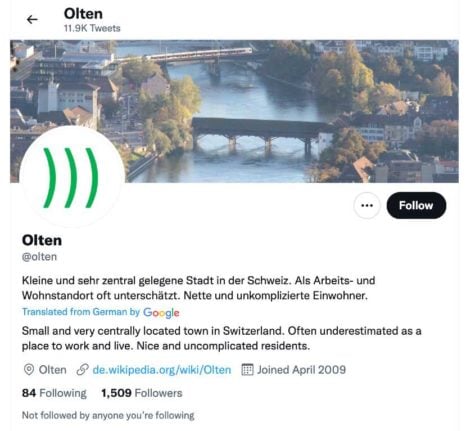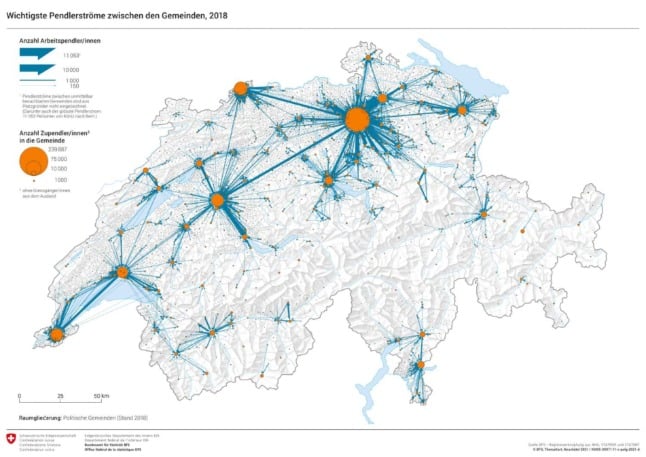Located 30 minutes away from Zurich in the canton of Solothurn, Olten is perhaps Switzerland’s truest incarnation of a commuter town.
The town’s official Twitter biography boasts of “friendly and uncomplicated residents” living in a city which is “often undervalued” as a place to live and work.

Starting out as a sleepy village – and still embodying many of those qualities – Olten has grown in popularity over time due to its fortunate location.
Under the banner “Clever commuters live in Olten” the city’s reputation as a commuter city has grown in recent years.

Olten is placed where the Basel-Chiasso (north to south) and Geneva-St.Gallen (west to east) lines meet, meaning that it is quick and relatively easy to get anywhere from Olten.
Olten is one of Switzerland’s most important rail hubs. More than ten times times as many passengers – 300,000 – travel through Olten as the amount that live there daily.
Not only is Olten 30 minutes from Zurich, it’s also 30 minutes from Bern, Basel and Luzern via train, meaning it is perfectly situated to access Switzerland’s economically strong towns.
MAPS: The best commuter towns when working in Zurich
MAPS: The best commuter towns when working in Geneva
MAPS: The best commuter towns when working in Basel
If you need to go further afield, there are plenty of other cities and towns within an hour of Olten, including most of German-speaking Switzerland.
For those who would prefer to drive rather than take the train, Olten is also situated close to an important autobahn junction.
The town brags that 80 percent of Switzerland is less than an hour away.
Due to this proximity, it also serves as a popular location for meetings and seminars, given that people can commute from several cities and quite literally meet in the middle.
İlke S, who moved to Olten just under a year ago, told The Local that Olten appealed to her as a well-connected and affordable place to live.
“It’s (a) perfect location and accessibility by train and affordable and easy to find housing,” she said.
“I have connections in all around Switzerland and I travel a lot, thus a centrally located place where I don’t have to search for an apartment for 6 months and finally settle for a studio for 1300 CHF was the reason I moved here.”
İlke said while the city had a lot to offer, it deserved its reputation as a commuter paradise.
“Well, there are so many people with similar mindset here… Olten is especially preferred by couples who work in different cities around Olten such as Bern, Basel, Lucerne or Zurich.”
İlke commutes to Basel but said Olten offered more for her than her workplace.
“Considering that I like to hike and also meet friends around Switzerland, living in Basel would not be ideal due to its location.”
Exact figures on the amount of people who commute to work in Olten are a little difficult to determine, at least in part because some people work at least part of the time from home.
Although the figures are a decade old, around one third of the workers who live in the canton commute to work.
The following map – put together by the Federal Office of Statistics in 2018 – shows commuter routes in Switzerland. Olten can be seen perfectly placed between Basel, Bern and Zurich.

What about renting in Olten?
As we covered in our summary of commuter cities around Zurich, this is not only much cheaper than Switzerland’s most populous city – but many of the country’s larger metropolises.
Rents in Olten are roughly the same as the Swiss average, or around CHF1,330 for a two-to-three bedroom apartment, much cheaper than in Zurich.
The vacancy rate is also double that of the Swiss average, which means you’re in with a better chance of finding something you like – or of finding something at all.
İlke said that the facilities may not be as suited to international workers as in Geneva or Zurich, although that could be relatively easily overcome.
“It is much more difficult to find apartments with a washing machine in the apartment compared to bigger cities, if this would be an important point for those who would consider moving here.”
What is there to do in Olten itself?
While many of those who move to Olten do so due to its proximity to other cities, there is plenty keeping people in the town.
Olten’s old town is remarkably well preserved, meaning that it has retained its true village feel.
There is plenty to do and see, with several museums and one of Switzerland’s best cabaret scenes.
The town has retained a sleepy feel, particularly during the day when up to a third of its residents are somewhere else.
There are several car-free pedestrian areas, which make it popular on the weekend with shoppers as well as with families.
Finding a flat in Switzerland: How to stand out from the crowd
İlke, who previously lived in larger cities in both French and German-speaking Switzerland, told The Local that the quality of life was also a major reason she chose the city.
“Olten is a green and calm city with a very beautiful old town and the Aare. I don’t need to use public transport to go around the city center, even a bike is optional,” she said.
“Having said that, since it is less crowded in general, it is also ideal to take a bike tour, hike (there are lots of beautiful hikes without the usual tourist crowd) or do any other activity.
“As the city is less crowded, I love taking a walk along Aare or going to the local ice cream shop for instance. Everywhere is close, everything is available here.”
Olten finds itself at the foot of the Jura mountains, meaning it’s the perfect place for fans of hiking and biking, as well as skiing in the winter months.
Olden’s old wooden bridge is one of the symbols of the city. The bridge in its various incarnations is over 700 years old, although the current version was built in 1803.
İlke told The Local that people were more integrated into the community in Olten than in Switzerland’s larger cities, particularly when it came to speaking the local language.
“It is of course a small city, so don’t expect tons of events every night but there are nice events every now and then,” she said.
“Although there is an international community, it cannot be compared to big cities such as Geneva or Zurich, so you should be able to speak at least basic German to survive.”



 Please whitelist us to continue reading.
Please whitelist us to continue reading.
Member comments